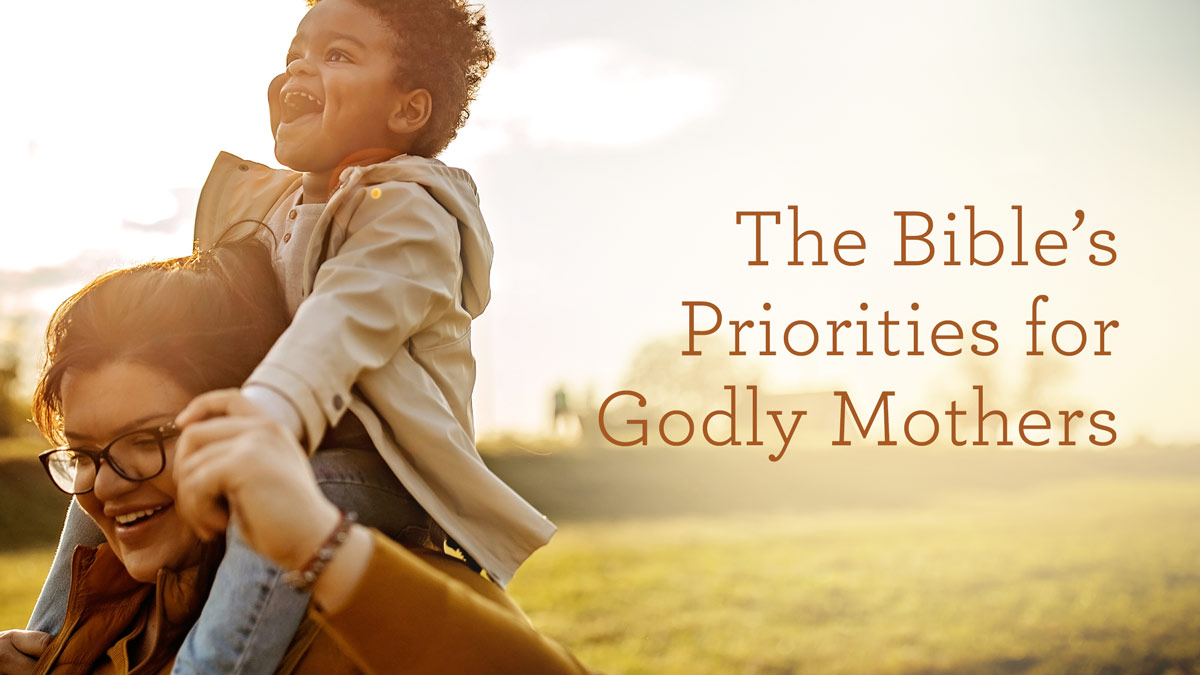
More than one hundred years ago, just before the outbreak of World War I, Congress passed a resolution to honor mothers on the second Sunday in May. For the last century, we have celebrated Mother’s Day as a day of reverence for the unique and sacred institution of motherhood.
Today, however, our culture is increasingly confused about a mother’s role. Some influential voices disparage motherhood in the name of liberation: “The home,” they say, “is your prison! Free yourself by joining the job market!” At the same time, women who pursue the privilege of motherhood aren’t always valued as the sacred and beautiful gifts to humanity Scripture declares them to be.
In response to such confusion, the Bible affirms that the freedom available only through Jesus Christ extends to all areas of our lives—including the details of motherhood.
One of the greatest misconceptions about the New Testament is the myth that it denigrates women. Just the reverse is true. The broad sweep of Scripture reveals quite a liberating role for women, from the garden of Eden to the ministry of Jesus and beyond. In contrast to Greek, Roman, and Jewish cultures, it was the radical new faith of Christianity that recognized full human rights for women.
In his letter to Titus, Paul offers us a window into the place of women, and mothers in particular, in the first-century church. Regarding the older women under Titus’s pastoral care, he writes that they should “train the young women to love their husbands and children, to be self-controlled, pure, working at home, kind, and submissive to their own husbands, that the word of God may not be reviled” (Titus 2:4–5).
Learn more about the Bible’s instructions for mothers by listening to the messages under the "Mothers” topic in our sermon archive.Listen
The women Paul has in mind have the advantage of years of experience; they have the opportunity to offer the value of their accumulated wisdom to younger mothers, who are establishing their homes for the first time. We should pay special attention, then, to the priorities of motherhood that Paul highlights. What do they reveal about a mother’s sacred role in God’s kingdom?
Love for Husbands and Children
Mothers are to be taught first to “love their husbands and children.” Ephesians 5:25 tells us that husbands are to love their wives, and here in Titus we find the reverse as an instruction.
Our culture tells us all the time through popular songs and movies that love is simply an emotion—but that is a starkly different definition from the scriptural one! The Bible tells us that between faith, hope, and love, “the greatest of these is love” (1 Cor. 13:13), and it remains when nearly all else passes away; if we have not love, we are nothing (1 Cor. 13:2). We must indeed be taught to love.

“The Bible teaches us how to love as God intends—and that when that kind of love is missing, nothing else can fill the gap.”
The Bible teaches us how to love as God intends—and that when that kind of love is missing, nothing else can fill the gap. If a wife cannot love her family as God intends, no career success will make up the difference. No expensive home will do. Conversely, godly love will pull us through when careers are in jeopardy and when the roof falls in. For mothers, then, immersing themselves in Scripture should be a priority, so that they may all the better learn to love God’s way.
Self-Control and Purity
What else is a priority for wives? They should not only know how to “love their husbands and children,” but also “be self-controlled” and “pure.”
These are requirements for all Christians, and particularly those in leadership. Ask mothers themselves, though, and they will tell you that in every area of motherhood—time, home management, caring for children, and so on—a special degree of self-control is required. They must watch their tempers and guard their hearts in the stress of parenthood. All these things take self-control, which is key to spiritual health.
Mothers must also remain pure in the midst of an adulterous generation. They must have surpassing loyalty to their husbands and children—loyalty which flows from their commitment to the Lord. The priority of family must be unchallenged by worldly matters—and that means maintaining purity.
Busyness at Home, and Kindness
Next, Paul’s epistle tells us of the priorities of being busy at home and maintaining kindness. Our culture would like to blot out women’s central role in maintaining a godly home. But the strength of our communities and nations largely proceeds from the integrity of our individual homes, from which our children emerge to further the next generation. Doing all that is necessary in the home will keep any mother busy. (If you’re doubtful, just ask one!) So, far be it from us to believe or proliferate the lie that busyness with household or family matters is “less than” other endeavors.
We must acknowledge, though, that such a pattern is not always possible. Many single mothers, for example, do not glory in their career opportunities; they would love the freedom to build a home for their children during the day. Their dilemma underscores the truth of the Scriptures and the crucial role that the local church must play in loving and helping all sorts of families.
But why is kindness mentioned here? Ask the husbands! At some point, many a husband has been charged with taking care of things while his wife was away, only to see the house descend into chaos in minutes. Such husbands will reveal that they came away with a profound respect for their wives—particularly in the matter of remaining kind amid the pandemonium of home maintenance! One of the greatest manifestations of a woman’s God-given grace is that when she’s under fire, she can maintain her composure and loving countenance.
Submission to Husbands
Fourthly, wives are to be “submissive to their own husbands.” We cannot live as God intends without faithfulness to this principle. When wives fail in this area, a domino effect comes into play, and every other aspect of the home is adversely affected. It is simply part of God’s arrangement for things.
Of course, we must understand the wonder of our equality before God, as set out in Galatians 3—but that equality does not negate God’s ordinance by which father and husband are the spiritual leaders in the home, and wife and mother submit to that headship.
This may sound backward or outdated in our modern world. Yet much of the way in which we live our lives today can be compared to a journey in which we find ourselves lost: we are certain we have followed the directions, yet here we are wandering around, clueless. Backtracking, we find that someone has turned the signpost around at an intersection, and we took the wrong way without realizing it.
That is the challenge confronting today’s wives and mothers as they make the journey of building Christian homes: the world has turned the signposts around. Mothers have the privilege of righting them, pointing others to Christ every step of the way.
Motherhood’s Wondrous Potential
At the end of Titus 2:5, Paul says that if we can do all these things, the Word of God will not be maligned by people. The reason for this is simple: we are the only Bible many people will read. They may have Bibles collecting dust on their shelves, but they never open them.
Those of us who live in submission to the wisdom of Scripture are embodying the Word to such people. When we follow the dictates of God’s wisdom—building strong homes and presenting powerful examples of marriage and parenthood—something happens: people gape in wonder. They marvel at the difference between our lives and their own, and the respect they have for us transfers to respect for God’s ways.

“Mothers are one of the greatest signposts God ever fixed on this earth.”
Surely one of the greatest avenues for the impact of the Gospel, then, is motherhood. Mothers are one of the greatest signposts God ever fixed on this earth. By His grace and mercy, they carry on daily with strength, love, consistency, the healing art, and just the right word at just the right time. The amazing care and effectiveness they display in thousands of ways tells us that behind them there is a Creator and Sustainer who also cares. And where they fall short, there is someone even stronger, someone more perfect and availing.
Loving mothers point us to a loving God—and that is a sacred privilege and gift well deserving of our gratitude, our reverence, and our prayers, today and every day.
 This article is adapted from Parenting God’s Way by Alistair Begg.
This article is adapted from Parenting God’s Way by Alistair Begg.

Topics: Articles